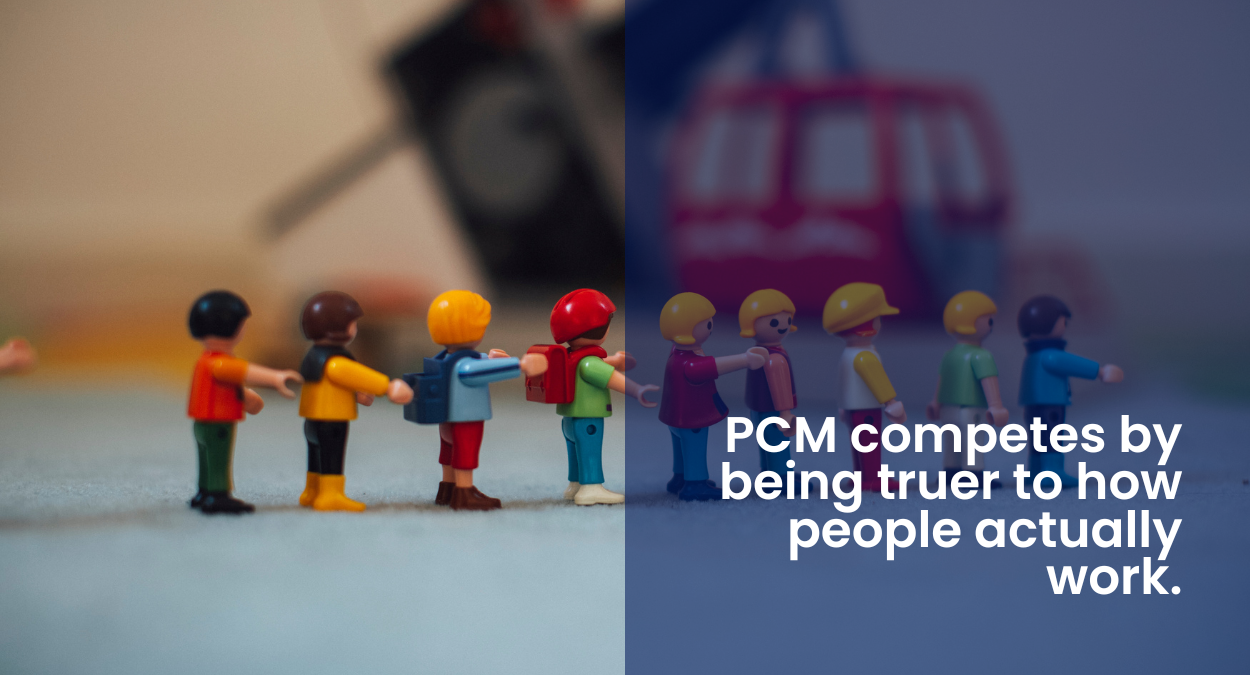Why you should never choose PCM over its competitors, unless you prefer tools that are flexible, evidence-based, and built for real people.
When Familiar Models Feel Safe but Limit Your Growth
In the world of training and personal development, professionals are surrounded by an impressive range of personality and communication tools. Each claims to unlock the secret to understanding people. Many of them are easy to use, quick to explain, and attractively simple.
It’s no wonder that competition among communication models is strong. From color-coded systems to rigid personality grids, they offer instant clarity — but that clarity often comes at the expense of depth.
Process Communication Model® (PCM) stands out in this crowded space. Rather than categorizing people into static boxes, PCM provides a dynamic framework that evolves with individuals. It captures how communication, motivation, and stress interact in real life — not just in theory.
If you’re looking for a model that mirrors the complexity of human behavior, PCM offers a competitive edge where simplicity falls short.
Why Popular Doesn’t Always Mean Effective
Models that reduce people to four or nine color-coded types are easy to teach and instantly recognizable. Yet beneath that popularity lie serious limitations:
-
Rigid categories that ignore the full spectrum of human behavior.
-
Static profiles that fail to capture how individuals change or respond to stress.
-
Shallow motivation insights that describe behavior but never explain it.
-
Limited scientific grounding, often built on anecdotes rather than data.
These frameworks work well for quick assessments or team icebreakers, but they often fall apart when professionals face complex interpersonal challenges or long-term organizational change.
PCM, by contrast, thrives where other tools plateau. It adapts to real-world conditions, offering a complete picture of what drives communication, energy, and behavior.
PCM and Competition: What Makes the Difference
 Unlike many of its competitors, PCM is not just a personality model. It is a communication framework rooted in decades of psychological research and real-world application.
Unlike many of its competitors, PCM is not just a personality model. It is a communication framework rooted in decades of psychological research and real-world application.
Here’s how PCM stands out in a competitive landscape:
-
PCM explains “why,” not just “what.” PCM looks beneath visible behaviors to reveal the psychological needs that drive motivation and stress.
-
Dynamic rather than static, PCM shows how personality shifts under pressure, offering tools to manage communication in real time.
-
Validated, not assumed, the model is backed by research recognized by institutions such as the Cognition and Emotion Journal and applied in leadership, education, and healthcare worldwide.
-
More than a typology, PCM builds bridges, not boxes. Where other models simplify, it connects — allowing trainers and leaders to adapt to each person’s preferred communication style and emotional landscape.
In short, PCM doesn’t compete by being simpler. It competes by being truer to how people actually work.
Scientific Validation: PCM’s Strongest Advantage
PCM recently gained even greater scientific credibility thanks to a new milestone study led by Sixtine Lefebvre, neuropsychologist, PCM trainer, and Head of PCM Research & Development.
Her 2025 research, published in Cognition and Emotion provides physiological evidence that emotional reactions during communication depend both on how we are addressed and on our PCM Base Type.
The findings confirm what trainers and leaders using PCM have observed for years: communication is not neutral. It is profoundly shaped by personality, emotion, and psychological needs.
Read the full analysis in our article: A Milestone for PCM Research.
Why PCM Outshines the Competition

If your goal is quick categorization, PCM might seem like too much to work. But if your mission is to create authentic understanding, sustainable behavioral change, and deeper human connection, PCM is unmatched.
Where other models label, PCM explains.
Where they simplify, PCM empowers.
Where they end, PCM begins.
That’s why trainers, HR professionals, and organizations around the world continue to choose PCM over its competitors: because it doesn’t just teach communication: it transforms it.
Learn More About PCM
Discover how PCM can help you stand out in a competitive professional landscape:
-
Explore the six personality types and their communication preferences with PCM Core Topics.
-
Become certified and integrate PCM into your training or leadership programs through PCM Trainer Certification.
PCM remains the reference point for those who want tools that are not only effective, but genuinely human.
Learn more about
Blue Monday Chronic Stress PCM: A New Perspective
Date: January 19, 2026
PCM Holiday Stress Strategies for Family Gatherings
Date: November 24, 2025
A Milestone for PCM Research: How Our Personality Shapes Emotional Responses in Communication
Date: October 20, 2025
PCM and Breast Cancer Awareness: A Story of Renewal
Date: October 9, 2025
PCM and Impostor Syndrome: Break the Cycle of Self-Doubt
Date: October 8, 2025
PCM Training Industry Partnership: A Game-Changer
Date: September 22, 2025


